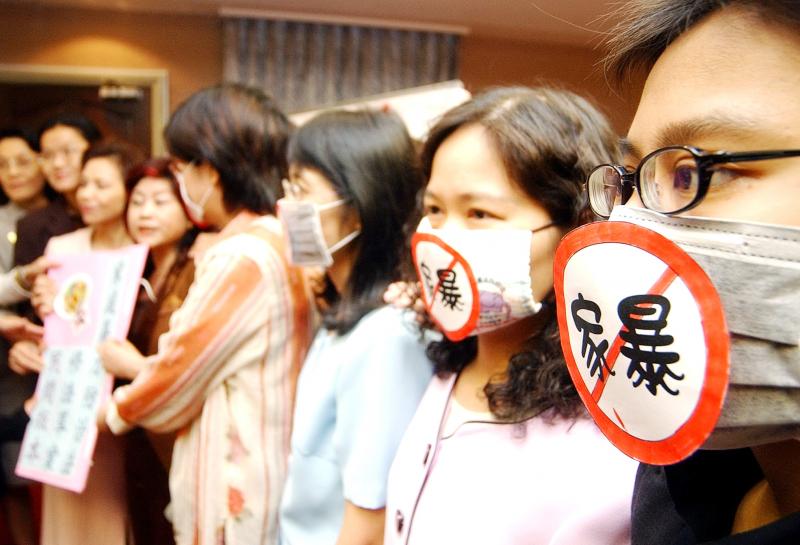June 20 to June 26
After enduring nearly a decade of abuse, 22-year-old Teng Ju-wen (鄧如雯) killed her husband Lin A-chi (林阿棋) during his sleep in October 1993. Teng was forced to marry Lin after he raped her when she was 13, and over the years he not only regularly beat her, but also terrorized her family and at one point stuck the heads of their two sons into a running washing machine during a fit of anger.
Teng ran away for a few months after a particularly nasty incident, but returned after Lin smashed up her parents house and threatened to burn it down and bury her brother alive. On the night of the murder, Lin allegedly came home drunk after unsuccessfully trying to rape Teng’s two sisters, and again threatened to kill Teng and her entire family.

Photo: Chao Shih-hsun, Taipei Times
It was her last resort. Teng had tried seeking help from the police, but due to the lack of domestic violence laws, her pleas fell on deaf ears. According to a Foundation of Women’s Rights Promotion and Development (婦女權益促進發展基金會, FWRPD) report, this was a time when a man beating a woman on the street could justify it by telling bystanders, “she is my wife.” And the common perception was that she must have done something wrong or had an affair to incur such wrath.
Teng soon turned herself in, which garnered much public attention. Women’s groups not only supported Teng during her trial, but also launched a campaign to enact legislation against domestic abuse.
It would take four more years and the shocking rape and murder of women’s rights activist and politician Peng Wan-ju (彭婉如) in 1996 for the government to finally take action. On June 24, 1998, Taiwan became Asia’s first country to officially enact legislation targeting domestic violence. It went into effect the following year.

Photo: Chiu Shao-wen, Taipei Time
The FWRPD report states that the law “smashed traditional notions that ‘domestic violence is a private issue and the law should not interfere with family matters.’” Furthermore, it declared to the nation’s citizens that ‘domestic violence is a crime, and the wife and kids are no longer the husband’s property.’”
OUTDATED PATRIARCHY
According to the FWRPD, there was scant statistical information on domestic abuse up to that point, and the available numbers only covered physical violence, not psychological or sexual violence. A Social Affairs Department survey in 1990 showed that 12.5 percent of married women had been physically abused, a number that rose to 17.8 in 1994. A poll by civic groups in 1995 showed similar percentages.
.jpg)
Photo: Tsung Chang-chin
The lifting of martial law in 1987 led to an explosion of social movements, including the establishment of a number of women’s rights groups. They provided help to abused women and began looking into ways to improve their lives, including setting up support centers and hotlines. The nation’s first emergency shelter was established in Taipei in July 1992.
Most of this work was carried out by civic groups and government social affairs departments, however, while law enforcement failed to act.
Although the Civil Code had provisions against spousal violence, the authorities were reluctant to invoke it, often calling the husband to the police station to take the wife home. The FWRPD report states, “Taiwan had long treated marriage violence as a family matter; it belonged in the private sphere. Society still championed the sayings, ‘Family harmony brings success to everything’ and ‘Follow the man you marry, whether he be a cock or a dog.’”

Photo: Liu Hsin-te
The government failed to see it as a serious social problem, preferring that the couple resolve their issues in private. Even if the case went to court, the judges usually favored the husband and prohibited children to stand witness. It was also difficult for women to obtain injury reports from hospitals, much less prove that the wounds were inflicted by the husband.
According to Lin Chih-li’s (林芝立) Study on Enactment Process of the Domestic Violence Prevention Law, the judges even considered factors such as the severity and frequency of the abuse, the education level and economic status of the perpetrator and how badly the abuse affected the marriage.
Lin’s study shows ludicrous quotes from judges denying a divorce, such as “the beatings were not frequent enough,” “it doesn’t count because she fought back,” “it doesn’t count because the wife disobeyed the husband,” and so on.
BUMPY PROCESS
Teng’s trial began in February 1994. Led by the Awakening Foundation (婦女新知基金會), women’s groups showed up to the courthouse in support of Teng, and also met with then-Minister of Justice Ma Ying-jeou (馬英九) to discuss a potential law to prevent spousal abuse. Lin writes that the justice system initially gave the idea little support, but the Ministry of the Interior provided NT$1 million for the foundation to research the drafting of such an act.
Meanwhile, the women’s groups organized conferences, forums and hearings regarding the issue. But many people still couldn’t see the need for a separate law targeting domestic violence, and accused the proponents of justifying Lin A-chi’s murder. The nation was preoccupied with the political situation with China, constitutional amendments and the Fourth Nuclear Power Plant, and the conversation never picked up steam. After the foundations completed the initial report, the effort ground to a halt due to personnel shortages and lack of further government funding.
The mission resumed when Modern Women’s Foundation (現代婦女基金會) chairwoman Pan Wei-kang (潘維剛) discovered that judge Kao Feng-hsian (高鳳仙) had already completed a draft of the act based on similar laws in the US and New Zealand. This law included other forms of domestic abuse instead of just targeting spousal violence. It helped that Pan also served as legislator of the ruling Chinese Nationalist Party (KMT), and she used her connections to garner more support. The law was presented to the legislature in July 1996.
Several high profile violent crimes rocked the nation in 1996, including the still-unsolved Peng Wan-ju case in November. This pushed the issue of women’s safety to the forefront once more, leading to a night march on Dec. 21, 1996 calling for a women’s right to be able to walk safely after dark. “Women want rights, not violence,” (女人要權力, 不要暴力) was the slogan. The Legislative Yuan quickly passed the Sexual Assault Crime Prevention Act (性侵害犯罪防治法), with the domestic violence law following six months later.
Problems with implementation and enforcement lingered, however, and in January 2001, women’s groups established the Domestic Violence Prevention Law Amendment League (家庭暴力防治法修法聯盟) to address the issues, beginning another arduous process.
Kao went on to help Japan draft its version of the law, which was adopted in 2001, and served as founding chairwoman of the Taiwan Coalition Against Violence (台灣防暴聯盟). She died on June 20 last year.
Taiwan in Time, a column about Taiwan’s history that is published every Sunday, spotlights important or interesting events around the nation that either have anniversaries this week or are tied to current events.

Jacques Poissant’s suffering stopped the day he asked his daughter if it would be “cowardly to ask to be helped to die.” The retired Canadian insurance adviser was 93, and “was wasting away” after a long battle with prostate cancer. “He no longer had any zest for life,” Josee Poissant said. Last year her mother made the same choice at 96 when she realized she would not be getting out of hospital. She died surrounded by her children and their partners listening to the music she loved. “She was at peace. She sang until she went to sleep.” Josee Poissant remembers it as a beautiful

Before the last section of the round-the-island railway was electrified, one old blue train still chugged back and forth between Pingtung County’s Fangliao (枋寮) and Taitung (台東) stations once a day. It was so slow, was so hot (it had no air conditioning) and covered such a short distance, that the low fare still failed to attract many riders. This relic of the past was finally retired when the South Link Line was fully electrified on Dec. 23, 2020. A wave of nostalgia surrounded the termination of the Ordinary Train service, as these train carriages had been in use for decades

Lori Sepich smoked for years and sometimes skipped taking her blood pressure medicine. But she never thought she’d have a heart attack. The possibility “just wasn’t registering with me,” said the 64-year-old from Memphis, Tennessee, who suffered two of them 13 years apart. She’s far from alone. More than 60 million women in the US live with cardiovascular disease, which includes heart disease as well as stroke, heart failure and atrial fibrillation. And despite the myth that heart attacks mostly strike men, women are vulnerable too. Overall in the US, 1 in 5 women dies of cardiovascular disease each year, 37,000 of them

March 2 to March 8 Gunfire rang out along the shore of the frontline island of Lieyu (烈嶼) on a foggy afternoon on March 7, 1987. By the time it was over, about 20 unarmed Vietnamese refugees — men, women, elderly and children — were dead. They were hastily buried, followed by decades of silence. Months later, opposition politicians and journalists tried to uncover what had happened, but conflicting accounts only deepened the confusion. One version suggested that government troops had mistakenly killed their own operatives attempting to return home from Vietnam. The military maintained that the